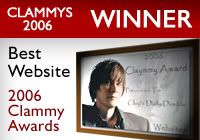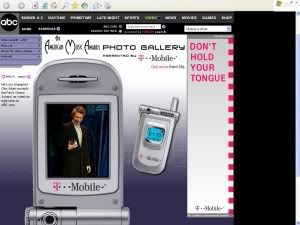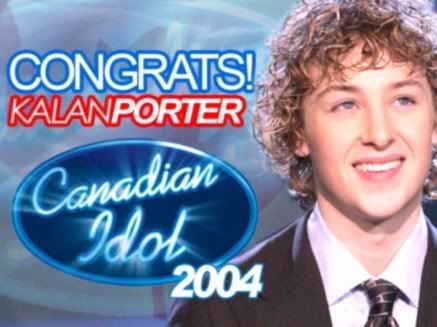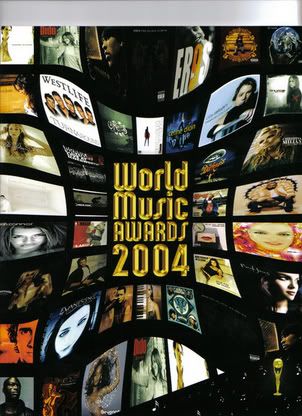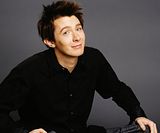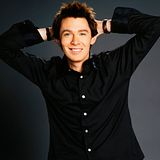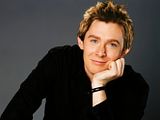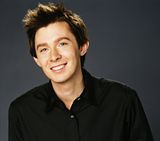COURTEST THE CLAY NATION NEWS (CNN)
Subject : Clay Nation News Evening: Interview with a Publishing Professional
Feel free to share this newsletter with other Clay fans
To subscribe to this newsletter, visit www.claynationnews.com
Clay Nation News
Evening News & Reminders
September 13, 2004
Q&A With a Publisher
Our guest interview is with a senior editor at a major publishing house. This person is knowledgeable in all facets of the publishing industry and has agreed to be interviewed for CNN in an effort to educate Clay's fans on how the publishing industry works, how booksales are recorded, and ways to "buy smart" so that our book purchases will do the most good for Clay in terms of sales, Bestseller lists and industry buzz. Feel free to send followup questions to cnn@claynationnews.com and we will do our best to get an answer from the publisher.
A Publishing Primer, or, EEEEEEEEEEE! Clay Aiken has a book out!
Q: Does it matter when I buy Clay’s book? I can’t wait!
A: Yes, it’s very important to buy LEARNING TO SING in the first two weeks (but not before the book is officially on sale) if we want the book to hit the New York Times bestseller list, which is widely considered the most important bestseller list in publishing. But remember: don’t buy it before the official on-sale date (Ed. Note: right now this looks like November 16), because sales before that date may not count towards first week sales. LEARNING TO SING should have a strict on-sale date, but many non-traditional outlets (i.e. wholesale clubs, supermarkets, Walmart, Kmart, Target) are known for putting books out early before their on-sale dates. In general, bookstores are better at enforcing dates, and some online retailers like bn.com and Amazon.com count sales for the first week even if it ships to you before the on-sale date.
Pre-ordering (both online and at bookstores) is also important because it lets both the outlet and the publisher know what kind of demand there is, and this can affect the number of copies printed and shipped. The more copies shipped, the bigger the buzz, but also the higher the expectations and the bigger the risks. For bigger books, Amazon will also order directly from the publisher rather than a distributor--something they don’t do with every book. There are rumors that the print run for LEARNING TO SING is around 200,000 copies, which is a very substantial number for a hardcover book. Publishers can also go back to press on books if sales outpace anticipated demand, and that is a Good Thing.
Q: Does it matter where I buy Clay’s book? I think it may be cheaper online or at Sam’s Club.
A: For the purpose of making the New York Times bestseller list, during the first two weeks of the book's release, please try to buy a copy at a store that reports to the Times list. Stores that are known to report to the Times include Barnes & Noble, Borders, Waldens, Books-a-Million, Walmart, Amazon.com, and Sam’s Club. Hastings and W.H. Smith also report to the Times, along with other stores (including many independent, non-chain bookstores), but there isn’t a comprehensive list of reporting retailers.
Most Christian bookstores do NOT report to the Times, and neither does BJ’s Club. I don’t believe Costco does either.
But this is purely about making sure the book hits the New York Times list, which is only one factor in a book’s overall success (although an important one). It is important to focus on the New York Times list for the first two weeks, because the publishing industry uses it as one barometer for the overall success of a book. However, it is also essential that Clay's book sells well at all the outlets carrying it, because a store that isn’t selling the book fast enough will likely return it to the publisher, and returns are a Very Bad Thing.
Q: So are bestseller lists the only way to gauge how well Clay’s book is doing? And is the New York Times list the only list out there?
A: There are lists other than the New York Times bestseller list--for example, most major newspapers have their own lists that reflect what’s selling well in the area (San Francisco Chronicle, Washington Post, Dallas Morning News, Denver Post, etc. all have their own lists). The Wall St. Journal has its own list, Publishers Weekly (the industry magazine) has its own widely respected list (I believe Entertainment Weekly bases it’s bestseller list on the Publishers Weekly one), and USA Today has an extensive Top 150 bestseller list which combines books of all formats and genres into one list that reflects actual cash register sales. The USA Today Top 50 list is printed every Thursday in the print edition--the online edition will have the Top 150.
Many retailers also keep their own bestseller lists, such as B & N, Waldens, Borders, etc., and the CBA (Christian book market) also has bestseller lists for their stores. Each list has a different method for determining the books that hit their lists, and all these lists are important, but traditionally the New York Times list has been the most prestigious and the most widely quoted, and hitting the Times bestseller list is one major standard for evaluating a book’s success.
One thing that isn’t necessarily reflective of how a book is actually doing is the bestseller placement in stores like Walmart, Target, Kmart, etc. Although the slots say #1 or #2 or #15, these positions are bought by the publisher, and are indications of publisher support rather than cash register sales.
Of course nothing is as important as cash register sales, and publishers have access to BookScan, which is to the book industry what SoundScan is for the record industry. BookScan tracks every book sold at many major retail outlets that sell books. It’s important to remember that BookScan does not include every retail outlet--it leaves out important outlets such as Walmart, Sam’s, BJ’s, and Virgin Megastore.
Q: What if I live in Canada? Should I order from the US or can I go to a Canadian bookstore?
A: Canadian book sales are only a fraction of American book sales, so if you want to help Clay’s sales, it would be more helpful if you buy the book from an American store if you can, even if it’s online through Amazon.com, Borders.com or bn.com.
Q: What if I buy an audio book or a download instead of the hardcover? Will that count towards his hardcover sales?
A: No, the only sales that will count toward his hardcover numbers are hardcover sales--audio books and e-book downloads are all counted separately.
Q: Is it okay to buy it used on Amazon?
A: No, not if you want Clay to see any royalties. Authors don’t get paid for any used book sales. Used book sales also do not count towards Bestseller lists.
Q: So does it matter if I buy online or I buy at a bricks-and-mortar store?
A: As long as they report to the New York Times, it doesn’t matter as much because all the sales will be accounted for. However, keep in mind that it is important that the book sell well at brick-and-mortar stores or they will be returned to the publisher. Fans should not make all of their purchases online.
Another time it matters is if Clay does book signings at bookstores. Then it will be very important that people buy his books at the actual signing, because the store will have ordered more copies of the book anticipating big sales from the signing. If he doesn’t sell many books at his signing, then it won’t generate the buzz necessary to be noticed in the industry and by the general media (for instance, Bill Clinton’s signings generated huge publicity because so many people turned out for them). The important thing to note about book signings is that the bookstore will usually not allow people to bring in anything from outside the store to be signed (i.e. no cds, magazines, etc.). Sometimes they will, but you won’t know until you get to the bookstore and an announcement is made at the signing. Even copies of Clay’s book not bought at the actual bookstore may not be allowed. So if you plan on attending one of Clay’s signings (that’s assuming that Clay does them of course), be prepared to buy your book at that store, even if you have already purchased one.
Q: Book signings--I love book signings! When we will start hearing about them? And how much promotion will Clay do vs. how much promotion other authors do?
A: Book signings will probably be arranged depending on Clay’s existing schedule. It’s arranged by the publisher usually in places where they expect a large turnout and can get decent media attention, so I’m guessing that New York City and Los Angeles will be the definites. And I wouldn’t be surprised if Raleigh is in the mix as well. Most celebrities only do a few select signings rather than a book tour, so I’m not expecting Clay to do more than six signings (I’m actually expecting more like 3 to 4 signings)--unless, they combine the possible Christmas CD tour with a book tour (see below). It’s also possible he may sign at more than 1 store in New York and LA, since they are such big markets. Signings don’t generally last for more than an hour--two at the most. If there’s a huge crowd, don’t expect more than a "Hey, how are ya?" as he signs your book--there will be security and publishing people there to make sure he doesn’t spend too long on one person if there are 50 others waiting in line for their turn.
The important thing to note about book signings is that the bookstore will usually not allow people to bring in anything from outside the store to be signed (i.e. no cds, magazines, etc.). Sometimes they will, but you won’t know until you get to the bookstore and an announcement is made at the signing. Even copies of Clay’s book not bought at the actual bookstore may not be allowed. So if you plan on attending one of Clay’s signings (that’s assuming that Clay does them of course), be prepared to buy your book at that store, even if you have already purchased one.
The publicity for book signings is usually up to the individual store, with the publisher helping out. Also expect the info to be listed on Clay’s official website. Expect local print media to mention any local signings, especially if Clay does an interview with them as well.
Clay will most likely appear on morning shows and talk shows to talk about the book, and the Christmas album as well (I definitely expect him on at least "Good Morning, America", and he did indicate that was likely in a recent interview). Most celebrities do get a fair amount of media attention, and I expect Clay to at least equal what other celebrities do, if not more.
If he signs at places that sell both the book and CD, then I’m hoping he can sign both as well. And something else to keep in mind--since there seems to be a Christmas tour in the works to support the Christmas CD, there’s also a chance that there will be signings set up in the cities on the tour.
Q: What if I don’t buy Clay’s book in the first month? Is it too late to make a difference?
A: If Clay’s book isn’t considered successful, and generally the first month of sales will determine whether the book is deemed successful or not, then bookstores will start to return the books back to the publisher. Heavy returns of any book equal publishing disappointment. If it is a disappointment because of slow sales, then the books will be remaindered in place--meaning, the book will be sold at a drastic discount directly by the publisher. This is different from remaindering through a third party, which happens with almost every book at the end of their hardcover life. The shelf life for a hardcover is usually six to nine months, because the paperback reprint is usually published a year after the hardcover is published. So if there’s still some hardcover inventory nine months after publication, the publisher will sell off the inventory to a company that specializes in buying and selling remaindered books. So even if you can’t buy it in the first month, don’t wait too long to buy it because the book won’t be on the shelf indefinitely. And the more slowly it sells, the quicker stores will be to return it back to the publisher.
Q: So if the book is returned, how does that affect Clay?
A: Clay received money to write the book, but it was an advance against royalties, meaning that once his advance earns out, he will get royalty checks twice a year. So if his book ships 200,000 copies, he’s expected to sell at least half of that amount. But this is where it gets tricky, because publishers do their accounting based on sales to their accounts (i.e. bookstores and other stores) and not on actual cash register sales. So when a bookstore orders a certain quantity of books, the publisher bills the store for that entire quantity. Books are considered sold unless they are returned back to the publisher. So even if a bookstore doesn’t actually sell every single copy of Clay’s book in their store, as long as it doesn’t get returned, it’s considered sold by the publisher. But the store will only keep copies of the book if they think they will sell it--if rate of sales is slow then that can indicate that they have too much stock. Stores reduce stock by returning books to the publisher. Every publisher hates returns, which is why when books start coming back too quickly and sales are slow, they may be forced to remainder in place as a sales incentive. So someone may be able to buy the book at a very low cost, but it’s a loss for the publisher and bad for the author.
So then Clay’s royalty check is based on books not returned--or books "sold" to the bookstore, rather than books "sold" to the consumer. So both kinds of sales are very important--cash register sales because that’s what creates buzz and excitement in the marketplace (besides it being what people actually buy), and sales to stores because that’s what his royalties will be based on.
--------------------------------------------------------------------------------
Eds. note: To clarify, for those who only plan to buy a single copy of the book, please try to buy it during the first two weeks from a bookstore that reports to the New York Times. The publishing industry will be watching the major bestseller lists, especially for the first few weeks, as a barometer for how the book is doing.
If you know you will buy multiple copies, then you can plan your purchases strategically: during the first two weeks especially, make your purchases from a store that will report to the NY Times. Then, if you're going to be buying extra copies for gifts for friends and family, you may buy them from Christian bookstores or Costco (discounts!) or any other store, but try to purchase at least some of them from stores who report to Bookscan.
Stores known to report to New York Times List:
Barnes & Noble
Borders
Waldens
Books-a-Million
Walmart
Amazon.com
Sam’s Club
Hastings
W.H. Smith
Stores NOT known to report to New York Times List:
Most Christian bookstores
BJ’s Club
Costco
Stores that do NOT report to Bookscan:
Walmart
Sam’s
BJ’s
Virgin Megastore














